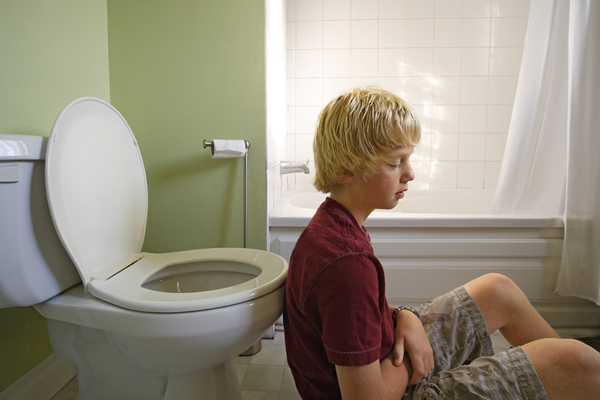Causes of vomiting in children without fever
Vomiting as a defense mechanism
The gag reflex is one of the vital reactions that ensure the preservation of human life in situations where the digestion of food poses a threat or interferes with other processes.
So, if a child has overeaten, or has eaten an exotic product, he vomits (usually the process proceeds without an increase in temperature). This is fine.
Other conditions in which vomiting in a child without fever does not require treatment:
When should vomiting be stopped?
A single vomiting attack most often does not threaten health. Repeated vomiting with a high probability indicates the onset of the disease.
In any case, the first couple of hours of vomiting should not be suppressed, because in this way the body gets rid of toxins, undigested food, bacteria. If the child has been vomiting for several hours after eating (no temperature), it is likely that the digestive system has already cleared. In this case, the child vomits "water" (actually, gastric juice and liquid drunk). If there is no temperature, the likelihood of intestinal infection is low. Most likely, the patient has food poisoning or a surgical disease of the gastrointestinal tract.
The nature of the vomit may suggest the cause of the disease. For example, in diseases associated with inflammation or intestinal obstruction, a sick child vomits bile (without fever or with an increase).
In the above cases, vomiting no longer has a cleansing function, but is a residual phenomenon as a result of strong irritation of the vomiting receptors of the stomach or intestines.
Frequent prolonged vomiting reaction threatens with dehydration, especially dangerous for young children. This condition requires urgent care.
Vomiting in infants
 Vomiting in a child under 1 year old without fever occurs quite often, since the digestive system of young children is immature, very sensitive to various irritants.
Vomiting in a child under 1 year old without fever occurs quite often, since the digestive system of young children is immature, very sensitive to various irritants.
If you do not take into account safe factors (teething, regurgitation, overfeeding, the introduction of inappropriate complementary foods), we can distinguish such common diseases in which a child aged 1-2 years vomits without fever:
- congenital malformations of the digestive tract (pyloric stenosis, pylorospasm, intestinal obstruction) appear in the first week of a baby's life, while the child is sick without fever and diarrhea, urges begin a few hours later or immediately after eating;
- the appendix can become inflamed even in infancy, and it is vomiting that will be its first manifestation. In a child less than 10-12 months old with appendicitis, the body temperature rises greatly, but the first few hours the condition proceeds without fever;
- Dr. Komarovsky calls a runny nose one of the causes of vomiting in a child without fever, if the sputum and pus flowing down the throat irritate the vomiting receptors, or the mucus is swallowed in large quantities;
- nasopharyngitis can also lead to irritation of the gag reflex receptors, while the child most often vomits at night or in the supine position, there is no temperature, the stomach does not hurt, and the stool is normal;
- in children with milk intolerance (allergy to milk protein, lactase deficiency), symptoms of indigestion may appear after each feeding; it is necessary to transfer the baby to a special diet (there are mixtures for artificial feeding that do not contain casein and lactose;
- the use by a nursing mother or baby of allergenic foods (most often with complementary foods) can provoke indigestion, along with which a rash appears.
Vomiting in preschool and primary school children
 Vomiting without fever in an older child, starting from 4-5 years old, may have the same causes as in infants (appendicitis, overeating, food intolerance). At the same time, there are other reasons specific to preschool and school age. The child is sick, vomits (but there is no temperature, or it is slightly elevated) with such diseases:
Vomiting without fever in an older child, starting from 4-5 years old, may have the same causes as in infants (appendicitis, overeating, food intolerance). At the same time, there are other reasons specific to preschool and school age. The child is sick, vomits (but there is no temperature, or it is slightly elevated) with such diseases:
In adolescence, this symptomatology may have such specific causes as:

Naturally, the more common causes should be considered first - food poisoning, intestinal infection, etc. If psychogenic causes are suspected, a psychotherapist should be consulted.
First aid to the sick
What to do if the child does not stop vomiting? How to treat it? To help the patient - to ease his well-being, prevent complications, speed up the process of cleansing from toxins and quickly restore normal digestion, follow these rules:
- in the first hours of the disease, it is impossible to try to stop vomiting and diarrhea, because this is how the body gets rid of the irritating substance;
- it is forbidden to take antiemetic, antibacterial, painkillers and any other medicines (except sorbents) until the causes of the disease are clarified;
- if you suspect that the cause is the use of a poisonous or spoiled product, provoke vomiting by pressing on the root of the tongue;
- since the main danger in this situation is dehydration, the patient should often drink water in small portions;
- an infant should be held semi-vertically, tilting its head to the side so that it does not choke on vomit;
- do not force-feed a person who is sick;
- if the patient asks for food, give preference to light low-fat food, start with a small portion;
- do not leave a sick child alone.
When should you call a doctor?
A condition in which a child is sick and vomits threatens his health, even if there is no temperature. As we found out, in some cases the patient can be helped independently, at home. However, sometimes urgent medical attention is required.
 Symptoms that require medical attention:
Symptoms that require medical attention:
- the child vomits so often that he cannot drink (the likelihood of dehydration is greatly increased even if there is no temperature);
- vomiting was caused by a medicine prescribed for the treatment of an acute illness, and its administration is impossible;
- severe pain in the abdomen;
- loss of consciousness or delirium;
- you suspect that the child has eaten a poisonous substance;
- body temperature rose sharply, or vice versa, fell to low values;
- vomiting and diarrhea have been going on for days;
- there are blood impurities in the vomit and feces.
Thus, the condition of a child with a disorder of the gastrointestinal tract should be carefully monitored. Sometimes the body temperature is normal for the first hours, and then it rises sharply - monitor its performance every 2-3 hours.
Remember that a timely visit to a doctor will reduce the risk to the health and life of your loved ones.







